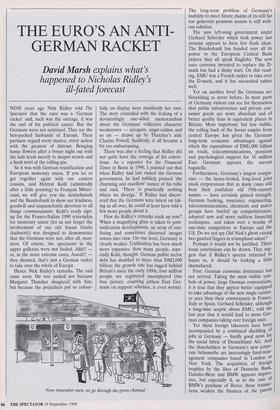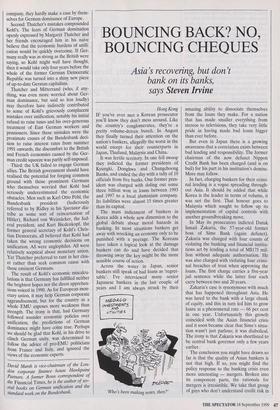THE EURO'S AN ANTI- GERMAN RACKET
David Marsh explains what's
happened to Nicholas Ridley's ill-fated forecast
NINE years ago Nick Ridley told The Spectator that the euro was a 'German racket' and, such was the outrage, it was the end of his political career. But the Germans were not surprised. They are the hen-pecked husbands of Europe. Their partners regard every motive, every action with the greatest of distrust. Bringing home flowers after a boozy night out with the lads leads merely to deeper scowls and a fresh twirl of the rolling-pin.
So it was with German reunification and European monetary union. If you let us get together again with our eastern cousins, said Helmut Kohl (admittedly after a little pressing) to Francois Mitter- rand, we will give you the deutschmark and the Bundesbank to show our kindness, goodwill and unquenchable devotion to all things communautaire. Kohl's ready sign- up for the Franco-Italian 1990 screenplay for monetary union (let us not forget the involvement of our old friend Giulio Andreotti) was designed to demonstrate that the Germans were not, after all, mon- sters. Of course, the spectators in the upper galleries were not fooled. Ahh!! or, in the more extreme eases, Aaaah !I they shouted, that's just a German racket to take over the whole of Europe.
Hence Nick Ridley's remarks. The end came soon. He was sacked not because Margaret Thatcher disagreed with him, but because the prejudices put so colour- fully on display were manifestly her own. The story coincided with the leaking of a devastatingly one-sided memorandum about the Germans' collective character weaknesses — arrogant, angst-ridden and so on — drawn up by Thatcher's aide Charles Powell. Suddenly, it all became a bit too embarrassing.
There was also a feeling that Ridley did not quite have the courage of his convic- tions. As a reporter for the Financial Times in Bonn in 1990, I pointed out that when Ridley had last visited the German government, he had publicly praised 'the charming and excellent' nature of his talks and said, 'There is practically nothing where we diverge.' If Ridley had discov- ered that the Germans were intent on tak- ing us all over, he could at least have told a few more people about it.
How do Ridley's remarks stack up now? When a magnifying glass is taken to post- unification developments, an array of con- fusing and sometimes distorted images comes into view. On one level, Germany is clearly weaker. Unification has been much more expensive than many people, espe- cially Kohl, thought. German public sector debt has doubled to more than DM2,000 billion; the growth rate has lagged behind Britain's since the early 1990s; four million people are registered unemployed (the true picture, counting jobless East Ger- mans on support schemes, is even worse).
'ow remember men, we go through the green channel.' The long-term problem of Germany's inability to meet future claims of its still far too generous pensions system is still with- out solution.
The new left-wing government under Gerhard Schroder which took power last autumn appears to have few fresh ideas. The Bundesbank has handed over all its power to the European Central Bank (where they all speak English). The new euro currency invented to replace the D- mark has had a shaky start. On this read- ing, EMU was a French racket to take over the D-mark, and it has succeeded rather well.
Yet on another level the Germans are flourishing as never before. In most parts of Germany visitors can see for themselves that public infrastructure and private con- sumer goods are more abundant and of better quality than in equivalent places in Britain. More important, but less visible, the rolling back of the Soviet empire from central Europe has given the Germans long-term economic advantages against which the expenditure of DM1,000 billion on roads, telecommunications, pensions and psychological support for 16 million East Germans appears the merest bagatelle.
Furthermore, Germany's largest compa- nies — the heavy-footed, long-lived joint stock corporations that in many cases still bear their confident old 19th-century names — have certainly gained strength. German banking, insurance, engineering, telecommunications, chemicals and motor groups have beefed up competitiveness, adopted new and more ruthless financing techniques, and taken over a swathe of one-time competitors in Europe and the US. Do we not spy Old Nick's ghost raising two gnarled fingers in triumphant salute?
Perhaps it would not be justified. Three loose conclusions can be drawn. They sug- gest that if Ridley's spectre returned to haunt us, it should be looking a little shamefaced.
First: German economic dominance has not arrived. Taking the most visible sym- bols of power, large German corporations, it is true that they appear better equipped to take advantage of the new single curren- cy area than their counterparts in France, Italy or Spain. Gerhard Schroder, although a long-time sceptic about EMU, told me last year that it would lead to more Ger- man companies taking over foreign ones. Yet these foreign takeovers have been accompanied by a continued shedding of jobs in Germany — hardly good news for the social fabric of Deutschland AG. And the shareholders in Germany's new corpo- rate behemoths are increasingly fund-man- agement companies based in London or New York. The acquisition of foreign trophies by the likes of Deutsche Bank, Daimler-Benz and BMW appears impres- sive, but especially if, as in the case of BMW's purchase of Rover, these transac- tions weaken the finances of the parent company, they hardly make a case by them- selves for German dominance of Europe.
Second: Thatcher's mistakes compounded Kohl's. The fears of German domination openly expressed by Margaret Thatcher and her friends encouraged him in his naive believe that the economic burdens of unifi- cation would be quickly overcome. If Ger- many really was as strong as the British were saying, so Kohl might well have thought, then it would take only four years before the whole of the former German Democratic Republic was turned into a shiny new piece of up-to-date German capitalism.
Thatcher and Mitterrand (who, if any- thing, was even more worried about Ger- man dominance, but said so less loudly) may therefore have indirectly contributed to some of Kohl's grievously complacent mistakes over unification, notably his initial refusal to raise taxes and his over-generous treatment of East German workers and pensioners. Since these mistakes were the proximate causes of the Bundesbank deci- sion to raise interest rates from summer 1991 onwards, the discomfort to the British and French economies caused by the Ger- man credit squeeze was partly self-imposed. Third: the UK failed to engage German allies. The British government should have realised the potential for forging common ground with those prominent Germans who themselves worried that Kohl had seriously underestimated the economic obstacles. Men such as Karl Otto PM, the Bundesbank president (ludicrously referred to by Ridley in his Spectator dia- tribe as some sort of reincarnation of Hitler), Richard von Weizsacker, the fed- eral president, and Kurt Biedenkopf, the former general secretary of Kohl's Chris- tian Democrats, all believed that Kohl had taken the wrong economic decisions on unification. All were anglophiles. All were relatively sceptical about monetary union. Yet Thatcher preferred to rant in her clos- et rather than seek common cause with these eminent Germans.
The result of Kohl's economic miscalcu- lations is that Germany has fulfilled neither the brightest hopes nor the direst apprehen- sions voiced in 1990. As for European mon- etary union, it may help German corporate aggrandisement, but for the country as a whole EMU exposes more weakness than strength. The irony is that, had Germany followed sounder economic policies over unification, the predictions of German dominance might have come true. Perhaps we should be glad that Kohl, in his drive to clinch German unity, was determined to follow the advice of pro-EMU politicians from France and Italy, and ignored the views of the economic experts.
David Marsh is vice-chairman of the Lon- don corporate finance house Hawkpoint Partners. A former Bonn correspondent of the Financial Times, he is the author of sev- eral books on German unification and the standard work on the Bundesbank.



























































































 Previous page
Previous page